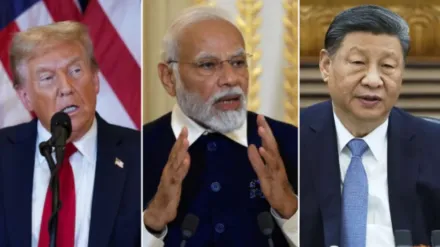On May 7, India conducted precise military strikes targeting terrorist camps and facilities in Pakistan and Pakistan-occupied Jammu and Kashmir, from where terrorist attacks against India have been planned and directed. Operation Sindoor was carried out in response to the terrorist attack in Pahalgam on April 22, in which 26 civilian tourists were killed.
The civilians were targeted for their faith and attacked for being Hindus. In response, India struck nine (9) sites in Pakistan and POJK.
The 26-minute operation, executed between 1:04 am and 1:30 am, struck nine terrorist camps, including key installations like the Lashkar-e-Taiba headquarters in Muridke and Jaish-e-Mohammed’s base in Bahawalpur.
“Our actions have been focused, measured, and non-escalatory in nature. No Pakistani military facilities have been targeted. India has demonstrated considerable restraint in the selection of targets and method of execution,” Indian officials said.
The worldwide reactions to India’s Operation Sindoor have been quite mixed, with some supporting the actions while many remaining neutral and pushing for de-escalation. Western nations, like the US and UK, have firmly backed India’s right to defend itself and its citizens.
US President Donald Trump expressed hopes that the situation ends quickly, acknowledging the long-standing tensions between the two nations. Responding to a question at a press conference, he said, “It’s a shame. Just heard about it. I guess people knew something was going to happen based on a little bit of the past. They’ve been fighting for a long time. They’ve been fighting for many, many decades. I hope it ends very quickly.”
US Secretary of State Marco Rubio voiced Trump’s remarks and said he was closely monitoring the situation between India and Pakistan. “I am monitoring the situation between India and Pakistan closely. I echo @POTUS’s comments earlier today that this hopefully ends quickly and will continue to engage both Indian and Pakistani leadership towards a peaceful resolution,” he said.
Indian Origin Tory leader and former UK Prime Minister Rishi Sunak came out vociferously in support of India’s actions. “No nation should have to accept terrorist attacks being launched against it from land controlled by another country. India is justified in striking terrorist infrastructure. There can be no impunity for terrorists,” he wrote on X.”
Meanwhile, Russian Foreign Ministry spokesperson Maria Zakharova said her country was deeply concerned about the escalating military confrontation between India and Pakistan. She called on both sides to exercise restraint to prevent further deterioration of the situation.
Israel, on the other hand, came out in full support of India’s actions. Israel’s Ambassador to India, Reuven Azar, said that the Jewish nation backed New Delhi’s right to self-defence. “Terrorists should know there’s no place to hide from their heinous crimes against the innocent. #OperationSindoor,” he said, while mentioning the name of India’s operation in the hashtag.
China, meanwhile, came out with a neutral stance, putting itself forward as a potential mediator in the clash. In a statement, China’s Foreign Ministry said, “China regrets India’s military action in the early hours of this morning and is concerned about the current development. We call on both sides to refrain from taking actions that further complicate the situation and exercise restraint. India and Pakistan are and will always be each other’s neighbours. They’re both China’s neighbours as well. China opposes all forms of terrorism.” China said it was willing to play a ‘constructive role’ in easing tensions between Pakistan and India.
Japan’s Chief Cabinet Secretary Yoshimasa Hayashi firmly condemned terrorism and urged both nations to exercise restraint and stabilise the situation through dialogue. Regarding the terrorist act that occurred in Kashmir on April 22, our country firmly condemns such acts of terrorism. Furthermore, we express strong concern that this situation may lead to further retaliatory exchanges and escalate into a full-scale military conflict. For the peace and stability of South Asia, we strongly urge both India and Pakistan to exercise restraint and stabilise the situation through dialogue,” Hayashi said. Tokyo will continue to monitor the situation closely while taking all possible measures to protect Japanese nationals abroad, he added.
UAE Foreign Minister Sheikh Abdullah bin Zayed Al Nahyan urged India and Pakistan to de-escalate tensions and avoid further escalation that could threaten regional and international peace.
UN Secretary General Antonio Guterres expressed concerns about the Indian strikes and called for “maximum military restraint” from India and Pakistan, his spokesperson said.
Also read: Operation Sindoor: India’s Redline in the Rewritten World Order
Operation Sindoor
The Indian Defence Ministry, in a statement, confirmed the launch of Operation Sindoor, aimed at dismantling terrorist infrastructure used to plan and direct attacks on Indian soil. The nine terror targets also included the Jaish-e-Mohammad stronghold of Bahawalpur and Lashkar-e-Taiba’s base in Muridke, around 50 km from Lahore.
The Indian government on Friday said that the precision strikes on terror camps across Pakistan and PoK were based on “credible intel” and aimed to “break the backbone of terrorism”.
The late-night strikes, which are believed to have eliminated over 80 terrorists, were executed within just 25 minutes under the Operation Sindoor.








